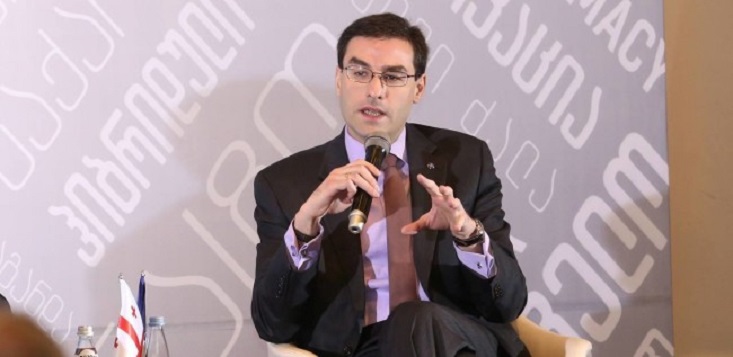Georgia is not only a consumer of global security
June 13, 2017 -
Shota Gvineria
-
Interviews

Interview with Shota Gvineria, Georgia’s Ambassador-at-Large for NATO and security policy. Interviewer: Małgosia Krakowska
MAŁGOSIA KRAKOWSKA: Georgia, Armenia and Azerbaijan are three independent states which have emerged from the former Soviet Union in 1991. After the collapse each of them has taken a different path. Armenia is apparently joining forces with Russia, Azerbaijan’s goal appears to remain neutral, while Georgia is seeking closer relations with the West. Why?
SHOTA GVINERIA: Historically, Georgia is strongly rooted in the European civilisation. In the fourth century, our country officially adopted Christianity. Since then Georgia has always been a part of Europe. Christianity created and maintained our European identity. Our first and foremost priority is joining NATO and the European Union. It is a natural choice for us.
Support for NATO is widespread in Georgia. Surveys show favourable views of Georgia’s prospective NATO membership. Georgia does not have any other alternative than joining the transatlantic security community.
Russia’s foreign policy strategy is based not only on coercive but also on soft-power methods which are used by Moscow to reject the post-Cold War world order. How does Russian disinformation target Georgia today?
Russian encroachment in the Black Sea region is a result of the Kremlin’s blatant claim to a renewed sphere of influence and Russian historical revisionism is a looming threat to Georgia. We have witnessed Russia’s alleged meddling in the French and American elections. German domestic intelligence services are also expecting Russian interference in the upcoming elections to the Bundestag [in September 2017].Georgia is not an exception.
The Kremlin influences our country through various media outlets and civil groups. In this regard, Georgian citizens emerge as the biggest target for Russian disinformation. The disinformation narrative is simple as it needs to be easily understood. Russians know that they cannot offer any clear and credible alternative to NATO or EU. For example, Russian media claim that Georgia’s aspirations to NATO are not a viable option, or that our foreign policy is in disarray.
During the 2016 Georgia’s Defence and Security Conference, our political establishment made it clear that the most damaging anti-western propaganda is aimed at strengthening the nihilistic sentiments among our citizens. The only effective way to deter soft-power is to provide a constant update of Georgia’s progress on its European and Euro-Atlantic integration path.
Georgia is one of the countries which aspire to become a NATO member. Currently, the co-operation between your country and NATO is based on – as you stipulated in one of your articles – “the art of words”. What does that mean exactly?
The “art of words’’ encompasses political support which is combined with strategic messaging on the irreversibility of Georgia’s membership to NATO. “The art of words” is another important deterrent against Russia’s aggressive foreign policy. It means that the only way to counter the threat is by taking a strong and clear position instead of strategic ambiguity. It has to be clear that NATO membership is not about technical or legal details, as shown by Montenegro’s accession, but about taking sides and strengthening value-based alliances.
In an article published by POLITICO.eu in July 2016, Damon Wilson claims that Georgia has made little progress in its NATO membership aspirations since the Alliance’s promises made during the 2008 NATO summit in Bucharest. Do you agree with this statement?
Absolutely not. During the 2016 Warsaw NATO Summit, the Alliance reiterated its readiness to continue mobilising resources needed for the successful implementation of the SNGP, which aims at enhancing Georgia’s defence capabilities and helps Georgia advance in its preparations towards membership in the Alliance. Our country also plays a vital role in the in the NATO-led operation in Afghanistan. In 2016, we have deployed 900 Georgian soldiers. We are the largest non-NATO member and troop contributor.
Georgia has invested and will continue to invest in international security. We are not consumers of global security. We also significantly contribute to it.
In the same text, Wilson says that the “EU and NATO failed to integrate Georgia more deeply which has disillusioned many Georgians of their country’s Euro-Atlantic aspirations”. What is your position towards this view?
No, we are not disillusioned. On the other hand, I can admit that Georgians were frustrated by Europe’s failure to see the 2008 war as a threat to European security. Except for the late president Lech Kaczynski, the majority of European political establishment failed to see the invasion as a conflict with global implications. Six years later, the Russian invasion and illegal annexation of Crimea in 2014 proved that Europe was wrong.
Shota Gvineria is Georgia’s Ambassador-at-Large for NATO and security policy.
Małgosia Krakowska is a Polish journalist focusing on international affairs and international security issues.

































